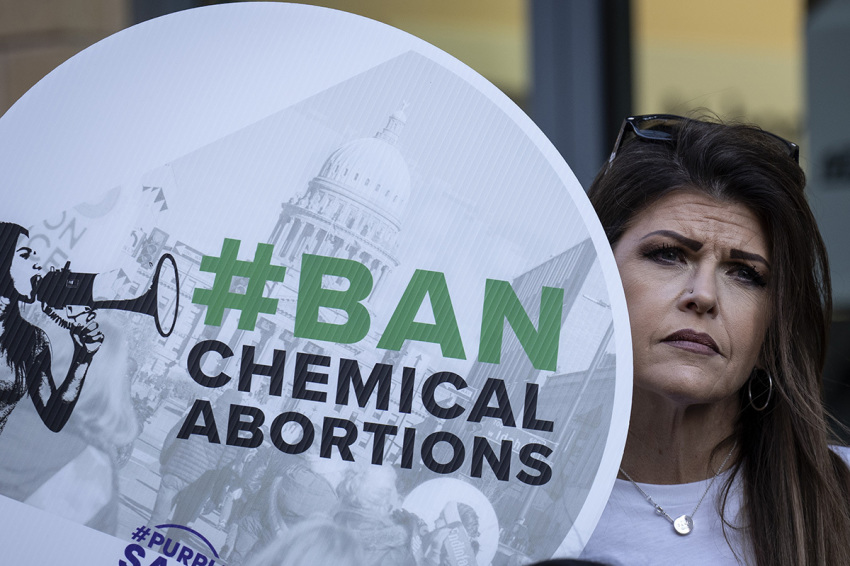16 AGs demand YouTube drop 'misleading' abortion notice from pro-life videos

A coalition of 16 attorneys general has demanded that YouTube remove information labels attached to videos discussing chemical abortions that they argue are "misleading" to viewers.
In a letter sent to YouTube CEO Neal Mohan on Monday, the attorneys general argued that the information panels the company included below videos on the popular video-sharing platform "misleads women seeking information about abortion drugs, potentially endangering their lives."
The letter cited a video posted by the conservative legal organization Alliance Defending Freedom in which a woman described her bad experiences using a chemical abortion pill at home.
YouTube added an information panel at the bottom of the video stating that "An abortion is a procedure to end a pregnancy. It uses medicine or surgery to remove the embryo or fetus and placenta from the uterus. The procedure is done by a licensed healthcare professional."
The attorneys general said in the letter that this was "false and misleading," as it suggested that "chemical abortions are performed by trained professionals. They are not."
"Although surgical abortions are still typically 'done by a licensed healthcare professional,' under current FDA protocols chemical abortions are 'done by' pregnant women themselves," read the letter.
"YouTube's false notice is not supported by any reliable source. The National Library of Medicine webpage to which the notice links does not discuss who performs abortion procedures, let alone state that licensed healthcare professionals do."
The attorneys general "expect YouTube will recognize the serious harm its notice poses and promptly remove or correct it," warning that if they do not remove it, "we will need to exercise our consumer-protection authority to protect pregnant women and other consumers from your falsehoods."
Iowa Attorney General Brenna Bird led the effort, joining the attorneys general for the states of Alabama, Alaska, Arkansas, Georgia, Indiana, Kansas, Mississippi, Montana, Nebraska, South Carolina, South Dakota, Texas, Utah, West Virginia, and Wyoming.
"Women deserve to know the truth about the dangers of chemical abortion pills," said Bird in a statement. "YouTube must end its blatant misinformation campaign that puts women at risk and quit targeting pro-life messages."
Last December, the U.S. Supreme Court agreed to hear the combined cases of FDA et al v. Alliance Hippocratic Medicine et al and Danco Laboratories LLC v. Alliance Hippocratic Medicine et al.
At issue in the cases is whether the Biden administration can loosen restrictions on the distribution of the abortion pill mifepristone, which included allowing women to acquire the drug without seeing a doctor first.
Mifepristone is the first drug in the chemical abortion regimen, which destroys the environment in the uterus and subsequently starves an unborn baby to death. It is reportedly used in about half of all pregnancy terminations in the United States.
White House Press Secretary Karine Jean-Pierre welcomed the Supreme Court's decision to hear an appeal in the case, arguing that a lower decision against the abortion drug "threatens to undermine the FDA's scientific, independent judgment and would reimpose outdated restrictions on access to safe and effective medication abortion."
"This Administration will continue to stand by FDA's independent approval and regulation of mifepristone as safe and effective," she said in a statement last year.
"As the Department of Justice continues defending the FDA's actions before the Supreme Court, President Biden and Vice President Harris remain firmly committed to defending women's ability to access reproductive care."
According to the FDA, mifepristone was first approved in September 2000 for terminating a pregnancy up to seven weeks gestation, which was then extended to 10 weeks gestation in 2016.
The FDA further contends that the abortion drug is safe, saying that the decision to approve it was "based on a thorough and comprehensive review of the scientific evidence presented and determined that it was safe and effective for its indicated use."
"The FDA's periodic reviews of the postmarketing data for Mifeprex and its approved generic have not identified any new safety concerns with the use of mifepristone for medical termination of pregnancy through 70 days gestation," stated the administration.
"As with all drugs, the FDA continues to closely monitor the postmarketing safety data on mifepristone for the medical termination of pregnancy."
U.S. Judge Matthew Kacsmaryk of the U.S. Northern District of Texas issued a stay against the FDA's 2000 approval of mifepristone last year, claiming the FDA "acquiesced on its legitimate safety concerns" based on "unsound reasoning and studies that did not support its conclusions."
"There is also evidence indicating FDA faced significant political pressure to forego its proposed safety precautions to better advance the political objective of increased 'access' to chemical abortion — which was the 'whole idea of mifepristone,'" Kacsmaryk, a Trump appointee, wrote.
In August, the 5th U.S. Circuit Court of Appeals upheld the FDA's 2000 approval of the drug but restored the agency's pre-2016 regulations for the abortion pill requiring the drug to be obtained in person and prohibiting mailing the pill or prescribing it virtually.



























